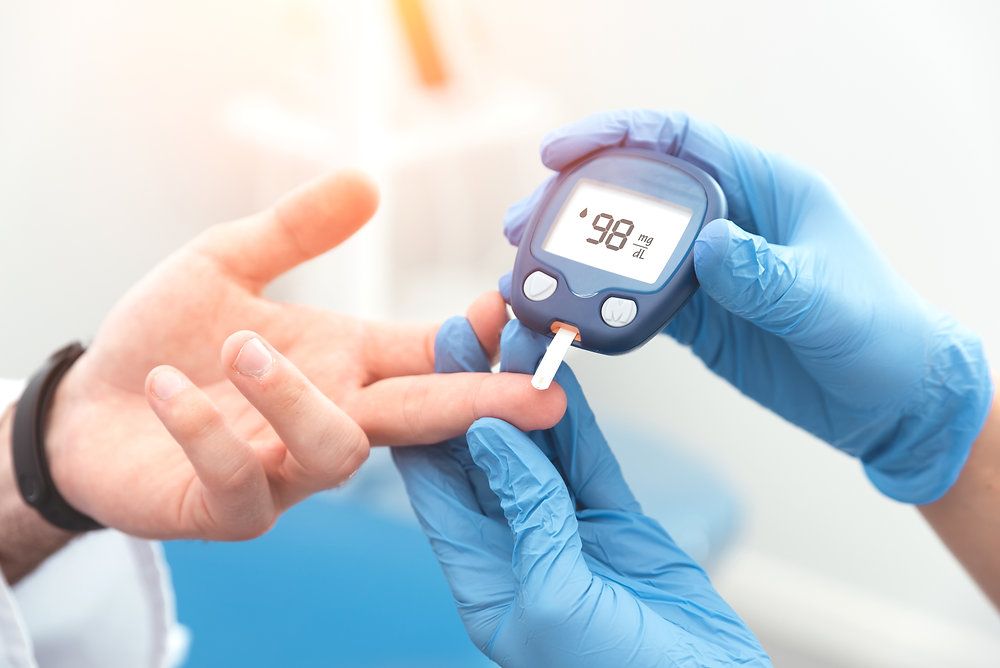Pre-Diabetes / Diabetes

Diabetes / Pre-Diabetes / PCOS
All of these conditions have their roots in insulin resistance. I can help my clients reverse their insulin resistance through changing their diet. This will not only get them healthier, improve their blood sugars, help them lose weight, and never be hungry. All conditions with a root in insulin resistance always make it very difficult to lose weight and feel high energy. This is not about genetics like people are mislead into believing – but it is a dietary issue. The great news is that insulin resistance can be reversed in a short time and diabetes, pre-diabetes, and PCOS (Poly Cystic Ovary Syndrome) can all be reversed through diet.
Inflamation
One of the biggest problems with these conditions is that they cause the body to be inflamed. Inflammation causes many issues that impact diabetes. Working on reducing insulin will improve energy and health by making the body less inflamed. I can help you develop a meal plan and lifestyle plan that will target the inflammation and allow you to lose weight without hunger.
Excessive Hunger
One of the symptoms are continually hear from my clients with insulin resistance is that they feel like they are starving – even a short time after they eat. There is a biochemical cause for this – it’s not their imagination! When a person with insulin resistance eats a a cookie, they actually become hungrier instead of satisfied. A person with a normal insulin level will eat that same cookie and start to feel full. I can help you reduce your insulin through diet and lifestyle so that you will feel satiated after a meal and be able to normalize your blood sugar which will result in being much more satisfied and able to lose weight without the usual struggle.
Pre-Diabetes
Navigating the Precarious Path: Understanding Pre-Diabetes
 Pre-diabetes is a condition that serves as an early warning signal, urging individuals to take proactive steps to prevent the progression to full-blown type 2 diabetes. While it might not grab headlines like its more advanced counterpart, pre-diabetes is a critical phase that demands attention. This article delves into the intricacies of pre-diabetes, exploring its definition, risk factors, potential consequences, and strategies for prevention.
Pre-diabetes is a condition that serves as an early warning signal, urging individuals to take proactive steps to prevent the progression to full-blown type 2 diabetes. While it might not grab headlines like its more advanced counterpart, pre-diabetes is a critical phase that demands attention. This article delves into the intricacies of pre-diabetes, exploring its definition, risk factors, potential consequences, and strategies for prevention.
Defining Pre-Diabetes
Pre-diabetes is a metabolic condition characterized by elevated blood sugar levels that are higher than normal but not yet high enough to be classified as type 2 diabetes. It serves as a cautionary phase, offering an opportunity for individuals to make lifestyle changes to prevent the development of diabetes.
Recognizing the Risk Factors
Several factors increase the risk of developing pre-diabetes:
- Weight and Lifestyle: Being overweight or leading a sedentary lifestyle increases the likelihood of pre-diabetes. Excess weight contributes to insulin resistance, a key factor in the condition.
- Family History: A genetic predisposition to diabetes can elevate the risk of pre-diabetes.
- Age: As age advances, the risk of pre-diabetes rises, especially after 45.
- Gestational Diabetes: Women who had gestational diabetes during pregnancy are at a higher risk.
- Polycystic Ovary Syndrome (PCOS): Women with PCOS are more susceptible to pre-diabetes.
The Consequences of Ignoring Pre-Diabetes
Left unaddressed, pre-diabetes can evolve into type 2 diabetes, a condition with far-reaching health implications. Additionally, pre-diabetes itself can increase the risk of heart disease and stroke.
Prevention Strategies
Pre-diabetes offers a unique opportunity to take control of one’s health and alter the trajectory towards diabetes:
- Lifestyle Modifications: A combination of healthy eating and regular physical activity is the cornerstone of pre-diabetes prevention. Adopting a balanced diet rich in whole grains, lean proteins, fruits, vegetables, and healthy fats, along with engaging in regular exercise, can help manage blood sugar levels.
- Weight Management: Maintaining a healthy weight is crucial. Even modest weight loss can have a significant impact on reducing the risk of progression to diabetes.
- Blood Sugar Monitoring: Regular blood sugar checks help monitor levels and detect any changes.
- Medical Guidance: Consulting a healthcare provider for guidance is essential. They can offer personalized advice and, in some cases, recommend medications to manage blood sugar.
Empowering with Knowledge
Understanding the significance of pre-diabetes empowers individuals to take charge of their health. Learning about portion control, mindful eating, and the effects of different foods on blood sugar can facilitate informed dietary choices.
Pre-diabetes is a pivotal juncture that offers the chance to rewrite one’s health story. It’s an opportunity to prevent or delay the onset of type 2 diabetes by making strategic lifestyle changes. By recognizing the risk factors, adopting healthy habits, seeking medical guidance, and embracing knowledge, individuals can navigate the precarious path of pre-diabetes with determination and emerge as champions of their own well-being.
Diabetes
Confronting the Modern Epidemic: Understanding Diabetes
Introduction
Diabetes, a chronic condition affecting millions worldwide, has emerged as a pressing health concern in the modern era. Its impact extends beyond the individual, affecting families, communities, and healthcare systems. This article delves into the complexities of diabetes, exploring its types, causes, symptoms, management, and the significance of early intervention.
Defining Diabetes
 Diabetes is a metabolic disorder characterized by elevated blood sugar levels, either due to insufficient production of insulin (Type 1 diabetes) or the body’s inability to use insulin effectively (Type 2 diabetes). A third type, gestational diabetes, occurs during pregnancy and usually resolves after childbirth.
Diabetes is a metabolic disorder characterized by elevated blood sugar levels, either due to insufficient production of insulin (Type 1 diabetes) or the body’s inability to use insulin effectively (Type 2 diabetes). A third type, gestational diabetes, occurs during pregnancy and usually resolves after childbirth.
Understanding the Types
- Type 1 Diabetes: Often diagnosed in childhood or adolescence, Type 1 diabetes is an autoimmune condition where the immune system attacks and destroys the insulin-producing cells in the pancreas. Individuals with Type 1 diabetes require insulin injections for life.
- Type 2 Diabetes: More common, Type 2 diabetes typically develops in adulthood. It is often linked to obesity, sedentary lifestyles, genetics, and insulin resistance. Lifestyle changes, oral medications, and insulin therapy might be necessary to manage Type 2 diabetes.
- Gestational Diabetes: Occurring during pregnancy, gestational diabetes requires careful monitoring to ensure both maternal and fetal health.
The Rising Tide of Diabetes
Modern lifestyle factors have contributed to a surge in diabetes cases. Factors like poor diet, sedentary habits, obesity, and stress play a pivotal role in the development of Type 2 diabetes.
Symptoms and Complications
Common symptoms of diabetes include increased thirst, frequent urination, unexplained weight loss, fatigue, and blurred vision. If left unmanaged, diabetes can lead to severe complications such as heart disease, stroke, kidney damage, nerve damage, and vision problems.
Managing Diabetes
While diabetes is a lifelong condition, its impact can be mitigated through proactive management:
- Blood Sugar Monitoring: Regular monitoring of blood sugar levels helps keep them within a healthy range.
- Healthy Diet: A balanced diet rich in whole grains, lean proteins, fruits, vegetables, and healthy fats helps manage blood sugar levels.
- Physical Activity: Regular exercise improves insulin sensitivity and helps maintain a healthy weight.
- Medications and Insulin: Depending on the type and severity of diabetes, medications and insulin therapy might be prescribed.
- Stress Management: Stress can impact blood sugar levels. Techniques like meditation and yoga can be beneficial.
The Importance of Early Intervention
 Early diagnosis and management are pivotal in preventing complications associated with diabetes. Routine medical check-ups, blood tests, and awareness of risk factors are crucial.
Early diagnosis and management are pivotal in preventing complications associated with diabetes. Routine medical check-ups, blood tests, and awareness of risk factors are crucial.
Diabetes is a formidable adversary, but with proper understanding, management, and support, it can be navigated. By making informed lifestyle choices, seeking medical guidance, and adopting healthy habits, individuals can confront diabetes head-on and lead fulfilling lives while effectively managing this chronic condition.
Confronting the Modern Epidemic: Understanding Diabetes
Introduction
Diabetes, a chronic condition affecting millions worldwide, has emerged as a pressing health concern in the modern era. Its impact extends beyond the individual, affecting families, communities, and healthcare systems. This article delves into the complexities of diabetes, exploring its types, causes, symptoms, management, and the significance of early intervention.
Defining Diabetes
Diabetes is a metabolic disorder characterized by elevated blood sugar levels, either due to insufficient production of insulin (Type 1 diabetes) or the body’s inability to use insulin effectively (Type 2 diabetes). A third type, gestational diabetes, occurs during pregnancy and usually resolves after childbirth.
Understanding the Types
- Type 1 Diabetes: Often diagnosed in childhood or adolescence, Type 1 diabetes is an autoimmune condition where the immune system attacks and destroys the insulin-producing cells in the pancreas. Individuals with Type 1 diabetes require insulin injections for life.
- Type 2 Diabetes: More common, Type 2 diabetes typically develops in adulthood. It is often linked to obesity, sedentary lifestyles, genetics, and insulin resistance. Lifestyle changes, oral medications, and insulin therapy might be necessary to manage Type 2 diabetes.
- Gestational Diabetes: Occurring during pregnancy, gestational diabetes requires careful monitoring to ensure both maternal and fetal health.
The Rising Tide of Diabetes
Modern lifestyle factors have contributed to a surge in diabetes cases. Factors like poor diet, sedentary habits, obesity, and stress play a pivotal role in the development of Type 2 diabetes.
Symptoms and Complications
Common symptoms of diabetes include increased thirst, frequent urination, unexplained weight loss, fatigue, and blurred vision. If left unmanaged, diabetes can lead to severe complications such as heart disease, stroke, kidney damage, nerve damage, and vision problems.
Managing Diabetes
While diabetes is a lifelong condition, its impact can be mitigated through proactive management:
- Blood Sugar Monitoring: Regular monitoring of blood sugar levels helps keep them within a healthy range.
- Healthy Diet: A balanced diet rich in whole grains, lean proteins, fruits, vegetables, and healthy fats helps manage blood sugar levels.
- Physical Activity: Regular exercise improves insulin sensitivity and helps maintain a healthy weight.
- Medications and Insulin: Depending on the type and severity of diabetes, medications and insulin therapy might be prescribed.
- Stress Management: Stress can impact blood sugar levels. Techniques like meditation and yoga can be beneficial.
The Importance of Early Intervention
Early diagnosis and management are pivotal in preventing complications associated with diabetes. Routine medical check-ups, blood tests, and awareness of risk factors are crucial.
Diabetes is a formidable adversary, but with proper understanding, management, and support, it can be navigated. By making informed lifestyle choices, seeking medical guidance, and adopting healthy habits, individuals can confront diabetes head-on and lead fulfilling lives while effectively managing this chronic condition.
Nurturing Health
Custom Diets and their Impact on Prediabetes and Diabetes Management
The journey through prediabetes and diabetes can be complex, but a crucial beacon of hope shines through in the form of personalized dietary interventions. A custom diet designed by a registered dietitian can play a pivotal role in managing blood sugar levels, improving insulin sensitivity, and enhancing overall well-being for those navigating these conditions. This article explores the profound impact of tailored nutrition plans on prediabetes and diabetes management.
The Importance of Nutrition
Diet is a cornerstone of diabetes management, influencing blood sugar levels, weight control, and overall health. For those with prediabetes or diabetes, making informed dietary choices can be transformative.
The Role of a Registered Dietitian
 Registered dietitians (RDs) are skilled professionals equipped with knowledge to develop individualized dietary plans. Collaborating with an RD allows for personalized guidance that considers factors such as medical history, lifestyle, and personal preferences.
Registered dietitians (RDs) are skilled professionals equipped with knowledge to develop individualized dietary plans. Collaborating with an RD allows for personalized guidance that considers factors such as medical history, lifestyle, and personal preferences.
Addressing Prediabetes with Custom Diets
- Balancing Carbohydrates: An RD crafts a diet that focuses on the type and quantity of carbohydrates consumed, helping stabilize blood sugar levels.
- Emphasizing Fiber-Rich Foods: Foods high in fiber, such as whole grains, legumes, fruits, and vegetables, can help regulate blood sugar and improve digestive health.
- Portion Control: Learning portion control empowers individuals to manage calorie intake and blood sugar levels effectively.
Custom Diets in Diabetes Management
- Carbohydrate Management: An RD assists in understanding carbohydrate counting, enabling better control of blood sugar levels.
- Glycemic Index Awareness: Foods with a low glycemic index cause slower rises in blood sugar, reducing the risk of spikes.
- Healthy Fats: An RD ensures that the diet includes healthy fats from sources like nuts, avocados, and olive oil.
- Consistent Meal Timing: Structured meal timings help manage blood sugar fluctuations.
Ongoing Support and Adaptation
An RD’s involvement doesn’t end with creating a custom diet. Regular follow-up sessions allow for progress assessment, monitoring changes, and adapting the plan to evolving needs.
The Power of Education
RDs provide invaluable education on label reading, understanding food’s impact on blood sugar, and making informed choices.
The journey through prediabetes and diabetes is not navigated alone. Custom diets designed by registered dietitians stand as guiding lights, offering hope, empowerment, and a path to better health. By collaborating with an RD, individuals can master the art of managing blood sugar levels, making positive dietary choices, and embracing a healthier lifestyle one meal at a time.
“Diets don’t work. You should never be hungry.”
Common Questions
One lab test will tell you your diagnosis. Hemoglobin A1C – (Hgb A1c) is a simple blood test that shows a 2-3 month average – as if you have taken your blood sugar every minute of the day. It is a percentage so that under 5.7% is a normal test result, 5.7%-6.4% is per-diabetes and 6.5% or greater is diabetes.
Both are caused by insulin resistance.
In most cases, yes. This is a dietary problem so by changing your diet you can reverse the problem.
Yes – this is reversed by lowering elevated insulin levels through diet and lifestyle.
Understand that lifestyle changes do not happen overnight. Make a commitment to yourself that you are ready to make a long term change in how you are living now with both diet and lifestyle.
